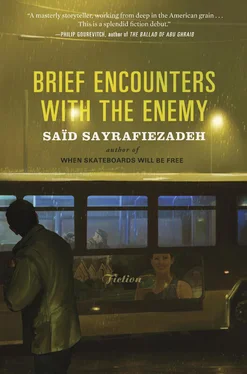Each morning that January, on my way to the train station, I would buy a newspaper from the newspaper guy on the corner. “What’s the word today, buddy?” I’d say.
He wasn’t interested in small talk. He wore a coat over his coat. He wore a hat pulled down so you couldn’t see his eyes. He wore a scarf wrapped twice around his face and tied in a knot. I paid him in change but he never bothered to count it.
The word was that the war was going to end soon. Our man had taken over. Our man had supplanted their man. Their man was on the run. We were on his tail. Any day now, the newspaper said.
Walking to the train station, I would examine the little box of numbers on the front page that outlined our progress from the day before. On our side the casualties were generally light, generally insignificant, one or two here and there, sometimes three or four, never more than five, while on the enemy’s side the casualties were gruesome, occasionally horrific, almost always at least one hundred, sometimes several hundred, and once, when two of their battalions had been cornered in the valley, eight hundred and twenty-one.
Turning the corner, I would bend in half against the wind that came off the river and caught me in the face and whipped the newspaper in my hands and whipped under my coat and up around my suit and tie. Up and down the street in front of the houses, the American flags were whipping too. Far away across the ocean, where the action was, it was warm, it was sunny, it was seventy-eight degrees. Every day the little box of numbers on the front page announced that it was seventy-eight degrees, and every day we inched closer toward catching their man, and every day I boarded the 8:02 and took a seat next to one of the regulars, who liked to make small talk, who said, “What’s the word today, Zeke?” But I wasn’t interested in small talk. I would recline in my seat with my cup of coffee and stare at the advertisements above my head of the handsome young men in their spotless uniforms, standing on the beach or on the mountaintop, smiling at the camera and draping their arms around their buddies’ shoulders as if they were having the time of their lives. “You too can help,” the advertisements read. “You too can make a difference.” Outside my train window, the frozen landscape of the city passed by, the suburbs first, then the schools, the factories, the warehouses, Walmart and Kmart, the fix-it shops, the scrapyards, the ghettos, and finally, thirty-two minutes later, coming fast over the bridge, the office buildings would appear, office buildings lit up twenty-four hours a day, including the one that in a few minutes I would be entering. This was the great progression of civilization.
In the reflection of the train window, I would look at my face, and I would wonder if — at the age of twenty-eight — I was still young, and if I was still handsome, and in the last quarter mile I would drift off and have a brief but vivid dream, a straightforward dream in which all symbols were apparent, in which I wasn’t on a train heading toward any cubicle on the forty-eighth floor but far away, tracking down their man with my gun, with my uniform, with my night-vision goggles, getting closer and closer to the glory.
We threw a welcome-home party for him. Some of the girls spent the morning decorating the conference room with signs drawn in blue and red markers, which said things like WELCOME HOME, WE’RE PROUD OF YOU, YOU’RE OUR HERO.
When the managing director came around to my cubicle collecting money for refreshments, I gave him three dollars.
“He sure is someone special,” the managing director said. I knew for a fact that he hardly knew who Wally was.
Who he was was the guy who delivered the mail, the mailboy , and I was the one who’d gotten him the job. It had been my job first. His father had asked me to put in a good word for him and I had. I’d known Wally since high school, where I was the valedictorian and he was a regular student in regular classes. Everyone had expected nothing from him and great things from me, but I’d made some bad choices and squandered some good opportunities and ended up having to sign on as “dispatch administrator,” which meant mailboy. I’d worked three years in the subbasement, sweating in every season, before getting promoted to the forty-eighth floor. Wally had worked three months in the subbasement before he signed up for the army. Now everyone thought he was special.
“He sure is,” I said to the managing director, and then I said what a shame it was that he had to come back home to the cold weather.
The managing director obviously wanted to talk more, to heap more praise on Wally, more unearned praise on someone he didn’t know, but it was ten o’clock and my phone was ringing. Everyone’s phone was ringing. It was time to get to work.
Bringg, bringg , the phones resounded through the cubicles, one hundred phones lighting up at once as if we were the command center for something important. Bringg, bringg . I watched the managing director walk away with my money and then I put on my headset and pushed some buttons the way a fighter pilot might push some buttons, and I said as pleasantly as I could, as naturally as I could, “Good morning. My name is Zeke. How may I help you today?”
Two hundred times a day I said this, exactly this, sometimes three hundred times a day. When Bruce Springsteen came to town, I said it six hundred times. It was always “good morning” until it was time for my break at eleven-forty-five, and then it was “good afternoon” until lunch at one o’clock, and after lunch it was still “good afternoon,” all the way until it was time for me to pack up and go home. Throughout the office I could hear the voices saying “good morning, good morning, good morning, my name is …” A chorus of salutations that would last for the next eight hours and, if you weren’t careful, could drive you crazy, could enter your unconscious and reappear when you were least expecting it, like last week when I was paying the cashier at the supermarket and I handed her my credit card and said, loudly enough for everyone to hear, “Good morning. My name is Zeke …”
I wasn’t complaining, though. No one was complaining. We were lucky. We were bored out of our minds, but we were lucky. These were good times for us, flush times. Business was booming because of the war, because the factories had opened back up and everyone had jobs, everyone had disposable income, and all the concerts and circuses were coming to town.
The man on the other end of the phone wanted tickets to the circus. Tickets were fifty dollars apiece. He didn’t care. He wanted six. He demanded six. He didn’t say “please” or “thank you.” I tried not to take it personally. He sounded like he smoked and maybe drank, he sounded like he was overweight. He was condescending about everything. He was probably one of those guys who worked in insurance, probably sat on his terrace all day, even in the cold, drinking cans of soda and avoiding his family. Now he was trying to make up for his neglect with tickets to the circus. He didn’t say goodbye when he hung up.
After that it was an elderly woman who couldn’t remember the name of what she wanted to buy. “Oh my goodness, what was it?” she asked me as if I’d know. She was confused by everything, she struggled with everything, she was frustrated with herself. I was patient for a while, and then I lost my patience and became sadistic, forcing her to suffer ten times over for the previous caller’s coarseness. I leaned way back in my swivel chair playing dumb, not helping her with anything until she asked for it in just the right way, and then I gave her the least amount of information I could. She stumbled, she fumbled, “Um, um, um,” the air went dead and I let it stay dead. I got satisfaction from her bewilderment, picturing her in her kitchen twirling with anxious fingers the cord on the rotary phone. It was fun for me. It was a diversion. This is how time is passed in a cubicle.
Читать дальше












